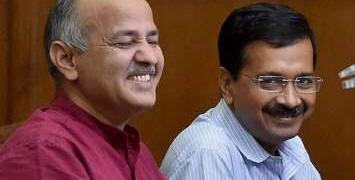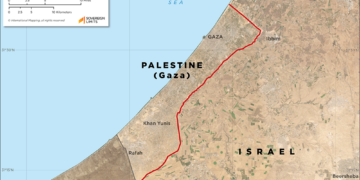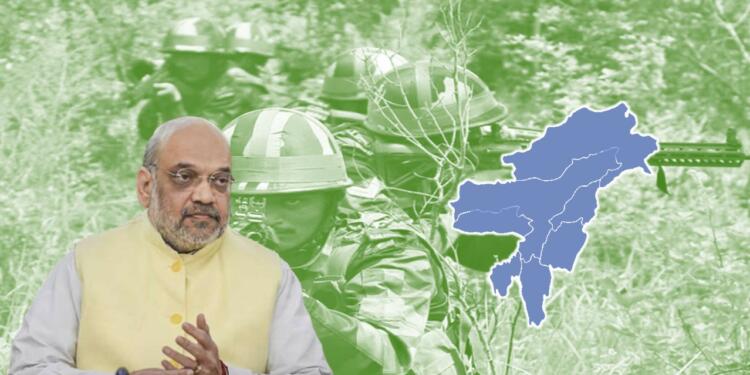After the peaceful resolution of 50 years old land dispute in the North-Eastern states of India. Home minister Amit Shah has achieved another milestone in an effort to bring unity to the country. Under his leadership, the government has decided to reduce the disturbed area under Armed Forces Special Powers Act (AFSPA) in the state of Nagaland, Assam, and Manipur.
Government reduces disturbed areas under Armed Forces Special Powers Act in Nagaland, Assam and Manipur. #AFSPA pic.twitter.com/US7eBr7mNE
— All India Radio News (@airnewsalerts) April 1, 2022
Read More: It is time to modify Jana Gana Mana to include North-Eastern states
Assam Chief Minister Himanta Biswa Sarma said that after the notification, AFSPA will be withdrawn from 60% of areas of the state. The reduction in the disturbed zone is a clear indication of peaceful resolution of all the concerns of the rebel forces. The continuous effort by the government to bring rebels to the table to talk has paid the price. The protection of the culture and unique identity of the tribal group has been given constitutional as well statutory recognition. The conciliation and mediation by the Government of India under the leadership of Home Minister Amit Shah are commendable.
Assam Chief Minister @himantabiswa Sarma says that the #AFSPA will be withdrawn from 60% areas of the state from mid-night tonight.
Chief Minister welcomes the decision of the Centre to withdraw AFSPA partially from 3 states of North East. pic.twitter.com/rhWsaeQ1Zz
— All India Radio News (@airnewsalerts) March 31, 2022
At a press conference in Guwahati, CM Dr @himantabiswa announced the Union Govt's decision to withdraw #AFSPA from 23 districts and 1 subdivision of Assam.
Hailing the move as bold and historic, the CM asserted that it will herald a new era of peace in the North East. pic.twitter.com/mBrfsegQan
— Chief Minister Assam (@CMOfficeAssam) March 31, 2022
Armed Forces Special Powers Act
The act was passed in 1958 to give special powers to armed forces in order to reduce and stop the armed rebellion against the state. Under the act, special powers like
- In the disturbed area, armed forces may fire on any person who is acting in contravention of any law or order
- Can destroy any camp used or maybe use in future
- Arrest without a warrant, any person who has committed a cognizable offence
- Enter and search without a warrant
Read More: Why did North East India will vote en masse for Prime Minister Modi?
The AFSPA in a way enables the member of the armed forces to freely work under unfavourable conditions in a disturbed area and deal with heavily armed insurgent groups. The act allowed the forces to use disproportionate powers against anyone who is challenging the authority of the country.
Read More: PM Modi is elevating the status of long-ignored Northeast India
Violence had become the way of life in the north-eastern states of India. The act allowed the forces to reduce its casualty and deal with armed rebellion groups with heavy hands.
In a significant step, GoI under the decisive leadership of PM Shri @NarendraModi Ji has decided to reduce disturbed areas under Armed Forces Special Powers Act (AFSPA) in the states of Nagaland, Assam and Manipur after decades.
— Amit Shah (Modi Ka Parivar) (@AmitShah) March 31, 2022
The criticism of AFSPA
The act came under heavy criticism from human rights groups and judicial groups due to some unwarranted incidents. Further, it was opposed because, the special act Criminal Procedure Code, 1973 which deals with procedural law of criminal offence was bypassed by the Act. The due process of law and procedure established by law under Article 21, the fundamental rights guaranteed by the Constitution of India were bypassed.
Read More: Northeast is now becoming an impregnable fortress of the BJP
Need of AFSPA
The act was needed at the time when insurgent groups wanted to establish their independent country with the help of guns and bombs. The cessation from India on the gun tip can never be allowed. The multicultural country can lead to Balkanisation if we allow the arm forces to kill innocent civilians and demand cessation from India.
But after the peaceful resolution of the concern, they have laid their gun and taken part in the development and prosperity of the country. The government’s order to reduce the AFSPA is evidence that the state is ready to listen to the rebel group if they leave the path of violence and talk on the table.
Amit Shah and the BJP’s efforts in bringing peace in the north-eastern states of India should be lauded by everyone. Their effort to bring unity to the country is exceptional. From J&K to North-eastern states or in the Naxal area, the reduction in violence due to the carrot and stick policy is commendable.

























